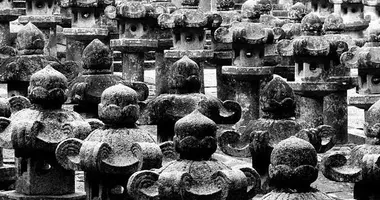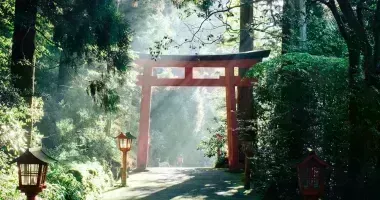Interview with a Kabuki Actor
Japan Visitor talks to the eminent kabuki actor Ebizo Ichikawa XI. Kabuki is a hereditary career and, as the son of actor Danjuro Ichikawa XII, Ebizo is the heir apparent to the kabuki world's most famous name.
Interview with Kabuki Actor Ebizo Ichikawa XI
By Joe Sinclair
 Kabuki actor
Kabuki actor
Dressed in the black robes of a wandering samurai, Ebizo Ichikawa XI struts out to the centre of the stage and turns towards the auditorium, hands on hips. His face, legs and hands are still plastered in white makeup. But he has taken off his wig.
He calls out an order and the lights dim, sending the river, flowers and bushes into darkness. But beneath the spotlight, the twenty-eight year old kabuki's new superstar is glowing.
The dress rehearsal went well, but there are details to finalise and Ebizo is not yet satisfied. The lighting, the set, the performances, must all be perfect for tomorrow's first night.
The 'masks' of a kabuki actor
With the powerful calves of a football player and the poise of a martial artist, Ebizo exudes a confident machismo.
But he moves with the precise elegance of a geisha and the grace of a ballet dancer.
And all of these qualities are necessary for an art in which he is renowned for playing both swaggering males and delicate females.
Ebizo is in London to perform a season of kabuki, a rare opportunity for the Western world to glimpse the man hailed as the future of kabuki.
In Fuji Musume (The Wisteria Maiden) he plays the spirit of the wisteria, a delicate young maiden dressed in a flowery kimono, trailing purple wisteria blossom. The vibrant colours, artificial stage setting and stylised poses make each scene appear like a Japanese painting.
In Kasane, a tale of erotic horror, he is Yoemon, handsome, desperate, cruel and dangerous, a ronin pursued by his lover and his past.
Ebizo is the latest member of a Kabuki acting dynasty that stretches back to the late 17th century. Idolized in Japan, he is a star of TV and film, as well as the traditional Japanese theatre into which he was born.
Kabuki: a hereditary art
Kabuki is a hereditary career and, as the son of Danjuro Ichikawa XII, Ebizo is the heir apparent to the kabuki world's most famous name.
Danjuro is also in London, stony-faced and shaven-headed like his son. And although he is not here in an official capacity, he advises the cast and crew from the edge of the stage. Danjuro is both father and mentor and the two men appear very comfortable in each other's presence.
Having briefed the actors and musicians, Ebizo disappears backstage to remove his makeup. He returns more than an hour later wearing a suit and ready for interview.
Ebizo speaks
Because I've been performing in this kind of theatre since I was a child it has really become second nature, he explains in polite Japanese. There isn't any difficulty in changing sex or changing gender.
It's very normal in kabuki for actors to play many different roles over the course of a day's performance. First thing in the morning I could be playing a man, an hour later I could be playing a woman, the next play I'm someone very dynamic and bold, and after that an entirely different role again.
Ebizo first appeared on stage aged five, making his professional debut at seven.
All of these things are what son's of kabuki actors have to master whilst they're still children.
The father's role
And his father has clearly had a profound influence.
A popular proverb in Japan says children learn from watching their parent's backs. This is true. I've grown up as an actor through watching what my father does.
But wasn't it difficult growing up in such an environment? In terms of difficulties I'm sure there were some but I can't remember them any more, he smiles.
Although he is very comfortable explaining the history of kabuki and his family, he seems unwilling to talk about anything too personal and sidesteps questions about his celebratory status with a disingenuous smile. I'm not as much of an idol as you may think. I lead a very ordinary life.
On the modern world...
But he does venture a view on how traditional Japanese values translate into the modern world.
From my point of view the idea of samurai spirit is no longer there at all and regular Japanese men are little different from men working here in England. They don't carry the idea of the warrior spirit around with them.
People like me, who have to learn martial arts for their work, may have a certain awareness of those qualities but it's not something that's going to guide their lives every day.
Perhaps it's a shame that people are not aware of history, but from a practical point of view most people's jobs and lives do not have a need for that kind of behaviour so maybe it's normal that it's not there any more.
He seems happy with the interview, giving a slight bow and a generous smile as he says goodbye. He joins his father in the stalls, snapping apart some disposable chopsticks, ready to eat.
They start discussing the upcoming performance kabuki's past, present and future, side by side.
 Kabukiza Theater, Ginza, Tokyo
Kabukiza Theater, Ginza, Tokyo
Related kabuki articles and pages
Kabuki: the Gutter and the Stars
Books on Japan
Japanese Festival Calendar (within-page search for 'kabuki' recommended per month)
Also by Joe Sinclair
Hitch-Hiking in Japan
Japan Travel Tips: Missing the last train in Tokyo
Hot Spring Bathing in Japan
Tokyo Story - Movie Review
Memoirs of a Geisha - Movie Review
Tony Takitani - Movie Review
Twilight Samurai - Movie Review
Fear And Trembling (Stupeur et Tremblements) - Movie Review
The Fog of War - Movie Review
Zatoichi- Movie Review
Interview with David Mitchell, author of "Cloud Atlas"
More Japan Interviews








